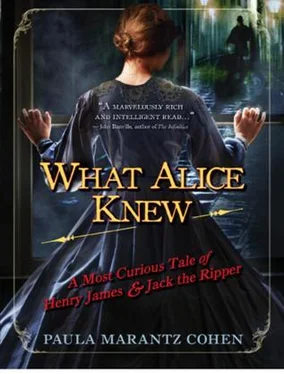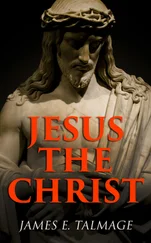“That was very rude of you!” exclaimed Henry with annoyance.
“Giving the poor man money?”
“Running off and leaving me there to deal with his excess of gratitude. He took hold of my waistcoat and wouldn’t let go. Wanted me to take all his cigarette butts, and I had to assure him that we were Americans and didn’t smoke. Next time you want to be altruistic, please don’t leave me holding the bucket—or, as it were, the butts.”
During the next hour, the brothers wandered through the area, where none of the witnesses associated with the Annie Chapman or Elizabeth Stride murders could be found, though they did unearth a young woman who had gone to dinner with Catherine Eddowes early in the evening of her murder and who said that there had not been any rendezvous arranged for later, as far as she knew. “Katie met her gentlemen where she could, and took care of business on the spot,” the woman asserted. “It wasn’t her way to plan ahead.”
William fleetingly wondered if the failure to plan ahead in such matters was another facet of what the great Darwin would argue served to winnow the species of its less adaptable specimens.
As the brothers moved through the neighborhood, William noted that Henry remained quiet. Not that there was anything for him to say, but since when had that ever stopped him before? Occasionally one of the respondents would address themselves to him, which gave William the annoying suspicion that they thought his brother was the higher-ranking official.
“That’s all the witnesses I have on my list,” he finally concluded somewhat apologetically after they had trudged through the maze of streets for several hours. They had arrived near the spot where Catherine Eddowes had been killed, and William noted that the pail with the placard was still there. He walked over and, once again, dug in his pocket and dropped in a coin.
“Perhaps a little random investigation would be helpful,” suggested Henry, looking around at a group loitering nearby. There were several young women, their blouses all but unbuttoned, and a shifty-eyed youth, who seemed on hand to retrieve the coin just dropped into the pail as soon as the men turned their backs.
William nodded at the suggestion and addressed the motley group. “Do you know the family?” he asked, motioning to the sign over the pail. “Do you know where we can find them?” He had checked the police records and had noted that there was no mention of a family for Catherine Eddowes.
The women with the unbuttoned blouses looked at him blankly, but the shifty-eyed young man stepped forward and responded in an aggressive tone. “What’s it to you?” he asked, spitting a wad of tobacco onto the pavement in front of the brothers and narrowing his shifty eyes.
William was about to turn away in disgust, when Henry addressed the man sharply. “We have reason to want to meet with the family,” he said in a crisp, authoritative tone. “Kindly tell us where we can find them.” As he spoke, he put his hand in his pocket as though suggesting that reimbursement for information would be forthcoming, though the gesture seemed as much threatening as potentially generous.
The young man’s posture straightened. “They’s not here, sir,” he said. “They’s been out of the area since Lord knows when; it’s to gather the coins that the people put that up.” He indicated the sign.
“You, you mean,” said Henry sternly.
“Not me,” said the man defensively. “I sometimes stop by to see what’s been put in, but it weren’t my idea.”
Several older women who had gathered on the steps of the building nearby approached, and the shifty-eyed young man, who must have decided he was out of his depth, sought their assistance. “These gents say as they have matters to discuss with Kate’s family,” he explained to one of the older women.
She had a square red face and a stout build and looked like she could wrestle half a dozen men to the ground if it were required of her. A flowered apron was the only indicator of some link to domesticity. “Katie had no family,” the woman said shortly. “What she had, gone off to Liverpool years ago, poor girl. What would you be snooping here for, anyway? The police are always snooping. Never gettin’ anywhere for it, though.”
“We’re not police,” William reassured her. “We’re Americans.”
Some members of the group nodded, as though they understood these sets to be mutually exclusive. “Maybe you’ll shoot the bastard who did this,” one of the women said. “You Americans at least know how to bring ’em to justice.”
“Bang! Bang! Shoot ’em up,” said a man without teeth, who had appeared out of nowhere. He looked at William, whose disheveled appearance was probably not reassuring, though perhaps he could pass for a cowboy.
Henry moved in to clarify. “We are here in an unofficial capacity to help with this sorry case. We are convinced, you see, that the American point of view may shed light on what may have been overlooked.”
There was more nodding among them. Henry’s courtly manner and clipped enunciation had drawn the respect of the crowd, and William realized that he had been wise, after all, to let his brother accompany him.
“Them Americans are smart,” called out one of the women. “Even the poor ones are rich over there.”
“We’re seeking additional views on what happened,” said William, taking the lead now that Henry had eased the way. “Anyone who might have theories or information that they wouldn’t want to share with the police, we’d be pleased to hear. We promise to keep what we’re told in confidence as far as possible.”
“Maybe Mary Wells’ll talk to ’em,” suggested one of the women. “She knew Polly Nichols.”
“Mary wouldn’t open ’er mouth to the police,” said another woman, “ever since they arrested her Tom for pilferin’.”
“Mary’s Tommy?” said someone else in the group. “Everyone knows ’e got sticky fingers.”
“She don’ deny it, only says ’e didn’t steal that time; they hung it on ’im ’cause he took the horse the week before. ’Er boy may be a thief, she says, but that don’ mean they can say anythin’ stolen, ’e done it. That’s corruption, she says, and it’s worse than stealin’.”
“She has a point,” said William.
“She might speak to you,” said another woman, “seeing as you’re American and she has that daughter in America.”
“Where does her daughter live in America?” asked Henry.
“She’s in some city. Milarky, I think it’s called.”
“Milarky?” asked William.
“She probably means Milwaukee,” said Henry. He then addressed the group. “It’s a fine city in the great state of Minnesota.”
“Wisconsin,” William corrected his brother under his breath.
“Yes,” continued Henry, undeterred, “we’ve spent quite a bit of time in Milwaukee. We might even have met her daughter.”
“In that case, you should talk with Mary for sure. She’ll want to hear any news about Tessie. She’s around the corner, two houses on this side. It’s the one with the yellow curtains. And she’ll be wearing a red apron. She goes in for the colors. What with Tessie gone and Tommy ’n prison, it’s the least she can do to keep ’er spirits up.”
Mary Wells wore the red apron that had been predicted, and she also had on a crisp white cap and a freshly laundered white blouse. Her home, though modest and not in the best repair, was neat and welcoming. She had opened the door wide enough at the brothers’ knock so that they could see inside, but she stood squarely blocking the entry and squinting at them suspiciously.
William was surprised at the economy with which Henry proceeded to make his case for an interview. “We are American citizens here to lend a hand in the resolution of the Whitechapel murders at the request of your queen. Your name was given to us as someone who might be of help. I should add that we are on a limited visit to London, since we have work to do at home in our great city of Milwaukee.”
Читать дальше












